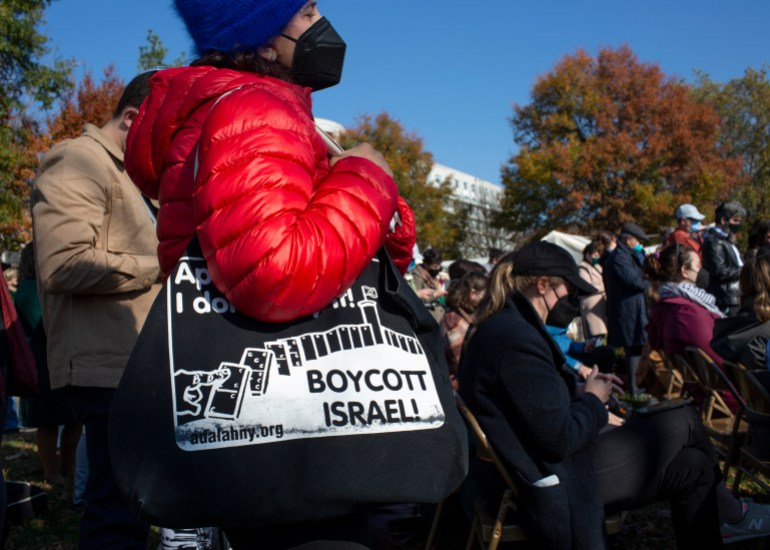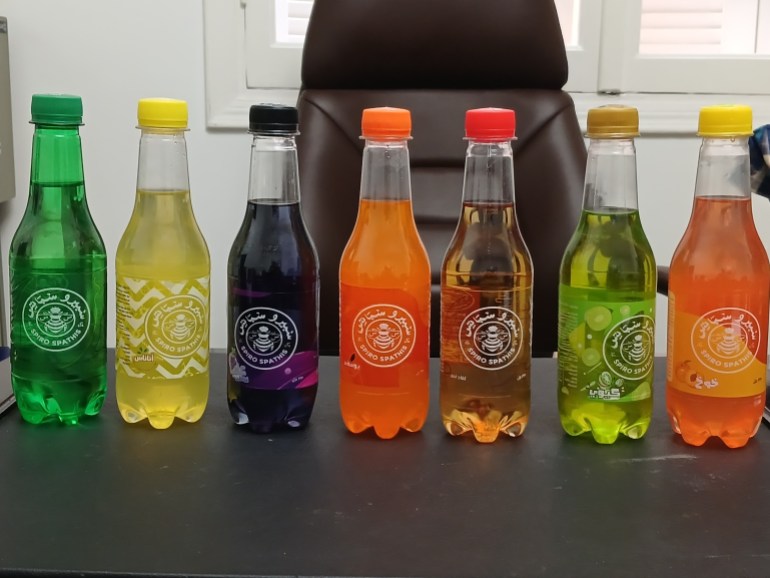
Cairo, Egypt – Spiro Spathis, Egypt’s oldest carbonated beverage company, is making a sensational comeback.
Founded in 1920 by a Greek beekeeper from Kefalonia, whose name it bears, “Spathis” has been a part of Egyptian life for generations.
Thanks to a nationwide campaign to boycott Western producers that support Israel, the centuries-old brand is now turning heads as a poster child for Egyptian solidarity with the Palestinians.
Spiro Spathis, which has always prided itself on its role as Egypt’s first soft drinks brand, presents slogans such as “100% Made in Egypt” and “Egypt’s original Gazouza”, using an Egyptian term believed to be derived from the French “gazeuse”. (carbonated) and is often used to describe carbonated drinks.
An increase in demand for spathis
“I have been selling their drinks for four years. There were always a few consumers who preferred spiro to other drinks, but not many,” said Mohammed, who owns a grocery store in Sharqia governorate.
“But now their bottles are empty almost instantly. Before the boycott I was selling four, maybe five boxes of spathis in a week, now I can sell up to 50 boxes in a day when I have that many in stock,” he continued, adding that demand has increased sharply ” firmly”.
“Demand has tripled in the last month,” Morcus Talaat, the company’s marketing director and one of three siblings who own the company, told Al Jazeera.
Talaat spoke to Al Jazeera between successive meetings in the modest two-bedroom ground floor apartment in an upscale Cairo neighborhood where Sprio Spathis is headquartered. “We received hundreds of calls from new customers…offers from restaurants.”
Spiro Spathis has launched a recruitment drive and received more than 15,000 applicants for the advertised positions to meet demand.
In Cairo’s Nasr City district, a kiosk owner says he has been unable to source enough spathis to meet demand. “I’ve only received four shipments in the last month and it sold out the same day. In the past, supplies of spathis lasted longer.”
Israel’s relentless bombardment and ground invasion of the Gaza Strip, which began on October 7 and has so far killed more than 11,500 Palestinians, has sparked mass protests around the world.
It also prompted many to do so Boycott international brands like McDonald’s and Starbucks.
In Indonesia, consumers began boycotting McDonald’s and other companies in mid-October after McDonald’s Israel announced on social media that it had distributed thousands of free meals to the Israeli military during the war on Gaza.
The announcement prompted several organizations, including the Boycott, Divestment and Sanctions Movement (BDS), the United People Front (FUB), and the Islamic Defenders Front (FPI), to boycott McDonald’s and other companies considered pro-Israel. including Burger King.
As protesters flood the streets of major cities around the world, from Washington, DC to London and Cape Town, the branches of franchise restaurants, cafes and shops that once bustled across the Arab world remain largely empty.
“Boycott is a popular tool for people to make their voices heard and the most effective means of putting pressure on Western colonialism and capitalism-driven states,” said Jamal Zahran, a political science professor at the University of Suez. “Boycotting these products also creates opportunities for local products.”

“Is that a fly?”
Since the start of the war, Egyptians have used social media to share information about which brands are considered supportive of Israel and should be avoided. Some apps also list alternatives to Western brands and highlight local manufacturers of the same or similar quality.
“Is it ours or not?” is a question that often comes up in meta posts about different brands when people are searching for which one they should give up.
The result has been the rediscovery of local substitutes like Spiro Spathis, which was once the sole producer of soda drinks in the Arab world’s most populous country.
But when other international brands came onto the market about 70 years ago and then flooded the local market, the company found itself on the sidelines. Spiro Spathis even closed its doors completely in 2014, said Talaat. “We are the second generation of Egyptians to own the company. Our father bought the company in 1998 and ran it until his death in 2009. We closed Spiro Spathis in 2014 before coming back in 2019 and have been present in the market every day since then,” he added.
Although it is not the only local soft drink company in Egypt, Spathis is praised as the best company by many online users in Egypt.

The company’s story and logo have been trending on social media and have attracted attention and piqued the curiosity of younger generations who are unfamiliar with the brand.
“Why is there a fly in his logo?” some asked on social media.
According to Talaat, the centuries-old logo is actually a bee and not a fly, signifying the founder’s original profession as a beekeeper on the Greek island of Kefalonia.
Social media users also joked that it was difficult to find a spathis lemonade due to increased demand and limited supply. “Trying to find myself and Spiro Spathis,” one Meta user quipped.
“We are working around the clock to meet the surge in demand,” Talaat said. “As of October 7, we are executing a year’s worth of expansion, growth and distribution plans in a one-month period to meet the needs of the market.”
In addition to expanding geographically, increasing production of its eight flavors and hiring teams to respond to consumer feedback and manage distributors’ orders, Talaat also plans to introduce a new cola flavor that customers have been asking for, to replace the colas boycotted in Egypt.
“This is not temporary”
Since the war, Egyptian social media users have noticed deals and discounts on Western-made products they have turned their backs on.
Many have also taken part in online debates about the effectiveness of such boycotts, which some say are seen as damaging to the livelihoods of Egyptian workers employed by franchises.
Sahar Azazi, 31, who lives in Cairo, said boycotting brands was the most obvious measure.
“It is the least we can do to support Palestinians under attack and it is not a temporary action on my part. I will not eat or drink anything that enabled the murder of an innocent Palestinian,” she said, adding that as a local product, Spiro Spathis was as good as the drinks she gave up.
“However, since the boycott began, they have not been as available,” she noted.
For Talaat, Spiro Spathis is back in business.
“We plan to always be there for Egyptian consumers, even if the boycott does not last. We are here to stay,” he said.
This story was published in collaboration with e.g.






Recent Comments